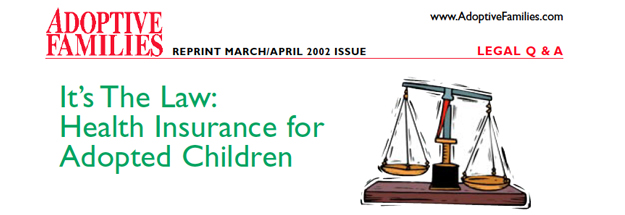BY MARK T. MCDERMOTT
Click HERE to View the Entire Article As a PDF
Q: Our health insurance carrier is refusing to provide coverage for the medical expenses incurred shortly after our newly adopted child was born. Is there any law that controls such situations?
A: As a result of Federal and state legislation that has been in place for several years now, discrimination by health insurance carriers against adopted children is prohibited in most situations. Prior to 1993, numerous problems existed. For example, insurance carriers would delay coverage until an arbitrary date, such as the finalization of the adoption in court. Another problem resulted when carriers excluded coverage for pre-existing conditions.
The Omnibus Budget Reconciliation Act of 1993 (OBRA’93), Public Law 103-66, amended the Employee Retirement Income Security Act of 1974 (ERISA). The amended law requires that any group health plan which provides coverage for dependent children must provide benefits to a child placed for adoption under the same terms and conditions as apply to a child who is the biologic child of a plan participant. OBRA’93 specifically eliminated any requirement that the adoption be finalized in court before there is coverage. The new law also prohibits carriers from restricting coverage of adopted children on the basis of a preexisting condition. The changes implemented by OBRA’93 apply to the medical benefit plans of all employers subject to ERISA. Since ERISA covers almost all employers except government employers, OBRA’93 provided broad coverage to families with adopted children.
Even the above gap in coverage has been closed. The Health Insurance Portability and Accountability Act of 1996 (HIPAA), Public Law 104-91, which also amended ERISA, extended the prohibition against discrimination to governmental employers. As a result, health insurance coverage for adopted children is now available to all families covered by group health plans as soon as those families assume financial responsibility for the child.
Several other things were accomplished by HIPAA. For example, HIPAA mandates that group health plans must offer the employee the right to enroll the new child in the plan immediately. Under prior law, immediate enrollment was sometimes not possible if the adopted child joined the family at a time when the employee was not eligible to elect coverage, i.e. when it was not “open season.”
Except in a small number of states that have special new laws, adoptive parents cannot purchase coverage for the birth mother’s medical expenses because she is not a dependent of the adoptive parents. The insurance coverage discussed in this article only covers the separate medical expenses of the child. If the adoptee is a newborn, he or she will have a medical bill, separate from the birthmother’s, reflecting the expenses incurred for the child’s care at the hospital from the time of birth until the child is discharged from the hospital. Those expenses are the ones which will be covered by the adoptive parent’s carrier. Under the law, as amended by OBRA’93 and HIPAA, coverage does not commence until the time of “placement.” The term placement, however, is defined in the statute as the time when the adoptive parent assumes financial responsibility.
Health insurance plans that are not employer-sponsored plans (i.e. individual plans) are not subject to Federal regulation. Those plans are regulated by state law. Fortunately, many states have their own laws that prohibit discrimination against adopted children in connection with health insurance. If you are covered by an individual plan, you should check the laws of your own state to determine your rights.
Mark T. McDermott, J.D., is a Washington,
DC attorney. He is a past president of the
American Academy of Adoption Attorneys and
currently serves as the Academy’s Legislative
Chairman. He is also an adoptive parent.

